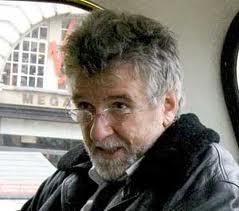A series of interviews with former employees at the motor manufacturing complex at Linwood, Renfrewshire, 20km west of Glasgow, Scotland.
Manufacturing activity first started at Linwood during WWII, under the government's shadow factory scheme, specialising in steel processing and gun barrels, managed by the Glasgow engineering company Beardmore's. After the war, the Pressed Steel company began to manufacture railway carriages, tractors, and body parts for cars and trucks. In the early 1960s, after government pressure, the Rootes car group built a new factory at the site, commencing the full-scale production of new motor-car models, including the Hillman Imp and the Avenger, massively expanding the Linwood site. The Linwood site was taken over by the American Chrysler corporation in 1967, and was again taken over by the French company Peugeot-Citroen in 1979. Following a prolonged period of financial difficulties and industrial unrest, the Linwood plant was closed by Peugeot in 1981. During its operation, Linwood was the only full-scale motor-car production facility in Scotland, employing 8,500 workers at its peak, one of the largest single manufacturing sites in Scotland. The former factory has now been demolished.
This project was a research project undertaken by Clifford Lockyer, an economist based at the University of Strathclyde, in the early 1980s. Lockyer had previously worked at the Linwood car factory, and in his own words, "sought to record the life of the Linwood factory from shadow war factory to closure".
The interviews cover the life-span of the entire plant, including a few workers who worked at the site during WWII. The evolving nature of the site, describing the varied work of the 1950s, is featured, including the production of car parts for Vauxhall, Ford, Rolls Royce, as well as the production of railway carriages, mostly for export, with India a main destination. The most significant development at the plant - the sudden move into full-scale car production in the early 1960s, and the resulting dramatic transformation of the site - is also strongly represented in the material (this expansion is often referred to in the material as a difference between the "south site" and the "north site"). Finally, the tumultuous years of the 1970s are also featured, including the events leading up to the plant's closure in 1981. Interviews cover a wide range of jobs roles at the plant, including operators, foremen, management, and trade union officials. A key division of labour at the site was between those operators in the "tool shops", and those who worked on the car assembly line "track", and both sets of workers are represented.
The overall flow of the interviews centres around the topic of industrial relations, which was Lockyer's specialist research area. Management policies, and their effects, as well as the changes in ownership are discussed by many interviewees. Management relationships with the shopfloor are frequently mentioned. Trade union activity at the plant is heavily featured in the interviews, and some interviewees describe their roles as shop stewards. Various industrial disputes and their consequences are also relayed in detail, including the trajectory toward plant closure. A large number of different trade unions operated at Linwood, and some workers describe the interrelationships and tensions between them, as well as the organisational structures and main personalities of each union group. Many workers also discuss their own attitudes and interactions with trade unions.
The Linwood plant was largely non-unionised in the 1950s, which some workers discuss, including its impact on working life. A strike in 1948, which led to the banishment of unions, is touched upon by a few interviewees. The unionisation process of the late 1950s, resulting in the comprehensive unionisation of the entire workforce, is featured in the material, including the impact on working conditions and management relations.
The working conditions of the workplace and the everyday routines of a car factory are highlighted. Interviewees discuss their own daily routines and the organisation of their particular work section. Some interviews go into detail about payment arrangements, including the "piece" system, and bonuses. The introduction of a nightshift in the 1960s is also mentioned. Health and safety risks are very occasionally alluded to. Workers discuss their own attitudes towards their job, their frustrations and motivations, and how this changes over time. The interviews feature discussion on day-to-day problems and difficulties at the site, commenting on production and design problems, as well as quality control.
Since many interviewees worked at the Linwood plant for many years, interviewees often comment on the rise and fall of the Linwood plant over time, making allusions to the wider economic and business climate. Interviewees chart the dynamics of changing workforce morale, changing work practices and changing management attitudes over time, and try to pinpoint "where it all went wrong", reflecting on reasons for the gradual demise of the Linwood plant and the motor industry in Scotland.
Finally, a handful of interviews feature the topic of women in the Linwood workforce. Women were typically employed in a few roles at the site, but changes to this configuration are also mentioned. One interviewee discusses how many women labourers were employed at the site during WWII, undertaking roles vacated by men. Another interview discusses how - in the late 1970s - women were employed in significant numbers in jobs which previously were exclusively performed by men, including on the car assembly line "track". At least one interviewee is a former female worker, who reflects on the lack of union representation among female workers.
Lockyer, Clifford, b. 1946, economist
